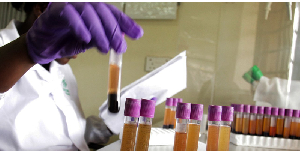Africa News of Tuesday, 30 April 2024
Source: monitor.co.ug
Raise awareness on matching blood types - Experts to government
Experts are calling on the government to raise awareness about rhesus compatibility and the importance of knowing one’s blood group, especially for couples considering pregnancy.
Rhesus (Rh) incompatibility, where the mother is Rh-negative and the fetus is Rh-positive, can lead to complications, including miscarriages and sometimes death if medication is not administered.
Beyond the well-known blood group classifications of AB and O that branch out into A, B, AB and O, there’s a crucial factor called the rhesus factor. This indicates the presence or absence of protein in red blood cells. Thus, classifications of negative and positive blood groups such as A-, B-, 0- and A+, B+, AB+ , among others.
Speaking in an interview with Daily Monitor, Dr Othiniel Musana, Past President Association of Obstetricians and Gynecologists of Uganda, explained: “If you have it (protein) we say you are rhesus positive, if you don’t have it, we say you are rhesus negative…generally as human beings, the rhesus factor has no problem, whether you have or not will not cause a major problem,” .
However, while the rhesus factor generally poses no issue for individuals, Dr Musana noted that it becomes crucial during pregnancy, especially for women who are rhesus negative. This becomes a concern when the father is rhesus positive.
“If you are rhesus negative and carry a baby and your baby inherits rhesus factor from the father and the baby is rhesus positive and you are rhesus negative, it means there is a very high chance the baby will get complications related to that,” he says.
Further still, Dr Freddie Bwanga, the director of MBN laboratories revealed: “If the mother who is Rh-negative and becomes pregnant with a man who is Rh-positive. The baby who comes out of that relationship usually becomes Rh-positive. The baby takes up the dominant gene, in this case the positive one.”
He adds that during the first pregnancy, there might be some complications for such a couple.
“During the first pregnancy the mother might be lucky and carry this baby to term but somewhere during pregnancy or childbirth the baby’s red blood cells might cross to the mother’s blood system, especially during the process of birth, “ Dr Bwanga says.
He added: “When that happens the body develops antibodies against anything foreign, in this case, the mother’s blood system will perceive Rh-positive cells of the baby as foreign and the mother will develop antibodies against those red blood cells that came from the baby. The firstborn might be produced well.”
Experts, however, say the subsequent pregnancies become risky.
“The next time she becomes pregnant, it means that likely the immune system will destroy the baby and cause problems ranging from miscarriages, hemolytic disease of the newborn where the baby loses most of their blood inside the uterus, sometimes death,” Dr Musana explained.
Once one discovers that the mother is Rh-negative, during an antenatal visit, health workers usually demand that the man’s or partner’s blood group be tested. Dr Musana says the mother is given a drug called Anti-D to prevent complications. This drug is administered at every pregnancy, though it’s costly with the cheapest dose at Shs160,000.
“We inject the mother, to sort of make her immune system settle and avoid attacking the pregnancy of that baby. It is given when the mother in that pregnancy has made at least seven months of pregnancy to protect the current baby. We don’t give it before because it might not be as useful. When you give birth within three days of giving birth we have to give another dose,” he added.
Despite the challenges, health workers reassure mothers that it is safe for couples with different rhesus factors to marry provided they are informed through consultation with health workers. The experts have urged the Ministry of Health to raise awareness about rhesus compatibility and urged women to know their blood group types early to avoid such complications.
They said health workers have been talking about mothers dying due to blood pressure but it’s also time to talk about rhesus incompatibilities.
Statistics show that 15 in 100 women world over are rhesus negative.
Rh incompatibility
Rhesus (Rh) incompatibility develops only when the mother is Rh-negative and the infant is Rh-positive.
Rh incompatibility can cause symptoms ranging from very mild to deadly. In its mildest form, Rh incompatibility causes the destruction of red blood cells. There are no other effects.
After birth, the infant may have yellowing of the skin and whites of the eyes (jaundice) and low muscle tone and lethargy is expected for mild Rh incompatibility.
Complications may include brain damage due to high levels of bilirubin, fluid buildup and swelling in the baby and problems with mental function, movement, hearing, speech, and seizures.











